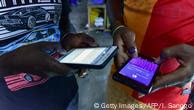that thenceforth she would be his alone.
CAMEROON
Anglophone Cameroon marks 50 days without the internet

It's been exactly 50 days since Cameroonian authorities imposed an internet blackout on English-speaking regions in the majority French-speaking nation.
anglophone
ˈaŋɡlə(ʊ)fəʊn/
adjective
-
1.
English-speaking.
"the population is largely anglophone"
noun
-
1.
an English-speaking person.
| ||
|
 | It's been exactly 50 days since Cameroonian authorities imposed an internet blackout on English-speaking regions in the majority French-speaking nation. |
anglophone
ˈaŋɡlə(ʊ)fəʊn/
adjective
- 1.English-speaking.
"the population is largely anglophone"
noun
- 1.an English-speaking person.
anglophone
ADJECTIVE
-
English-speaking.
‘the population is largely anglophone’
- English-speaking.‘the population is largely anglophone’
NOUN
-
An English-speaking person.
- An English-speaking person.
Origin
Early 20th century (as a noun; rare before the 1960s): from Anglo- + -phone, on the pattern of francophone.
inamorata
ɪˌnaməˈrɑːtə/
noun
-
a person's female lover.
"his new inamorata is a twenty-two-year-old mannequin named Jennifer"
Early 20th century (as a noun; rare before the 1960s): from Anglo- + -phone, on the pattern of francophone.
ɪˌnaməˈrɑːtə/
noun
- a person's female lover.
"his new inamorata is a twenty-two-year-old mannequin named Jennifer"
The word "square"[edit]
In Paris (and, more generally, in France), the English word, "square", has been borrowed to describe a particular type of public space. Specifically, a Parisian "square" is a small urban green space that is not large enough to be called a parc (the grassy variety) or a bois (the wooded variety), and it is not sufficiently formal in its plantings to be called a jardin. In the English-speaking world, a Parisian "square" might be called a vest-pocket park or, simply, a "green" (as in "the village green").
However, the French use of the word, "square", presents some small problems in interpretation because native speakers of English use the same word to mean a notable urban crossroads (like Times Square in New York City) or an urban roundabout (like Trafalgar Square in London), where neither grass nor trees nor flowers are present. Such a public space would be called a place in Paris: as in Place de l'Étoile or Place des Vosges or Place de Clichy. The French use of the word "place", —— where, in the USA, the UK, Canada, etc., an English-speaker would use the word "square", —— follows the pattern established in other European languages: the Spanish use the cognate, "plaza" (like Madrid's Plaza Mayor); the Germans use "platz" (Berlin's Potsdamer Platz); the Italians use "piazza" (Rome's Piazza Navona); etc.
So, in summary, the French have "squares" that might (or, more likely, might not) be called "squares" in English, and they use the word "place" to denote what an anglophone would almost certainly call a "square".
Squares in Paris
From Wikipedia, the free encyclopedia
Paris is known as the City of Light. Part of the credit for this soubriquet can be ascribed to long-standing city ordinances that have restricted the height of buildings in the central city. A more modest skyline, interrupted only by the Eiffel Tower, the Tour Montparnasse, Sacré-Coeur, and a few church steeples, lends this city's citizens virtually unfettered access to natural light. Nonetheless, another significant contributor to the feeling of openness in Paris is the vast number of public spaces, both green and paved, interspersed throughout all twenty arrondissements, that afford the citizen the opportunity to escape, if only momentarily, his urban environment and partake of air and light like his cousins in the provinces. The following article (and its accompanying list) concern the public spaces known as squares and places in Paris.

沒有留言:
張貼留言